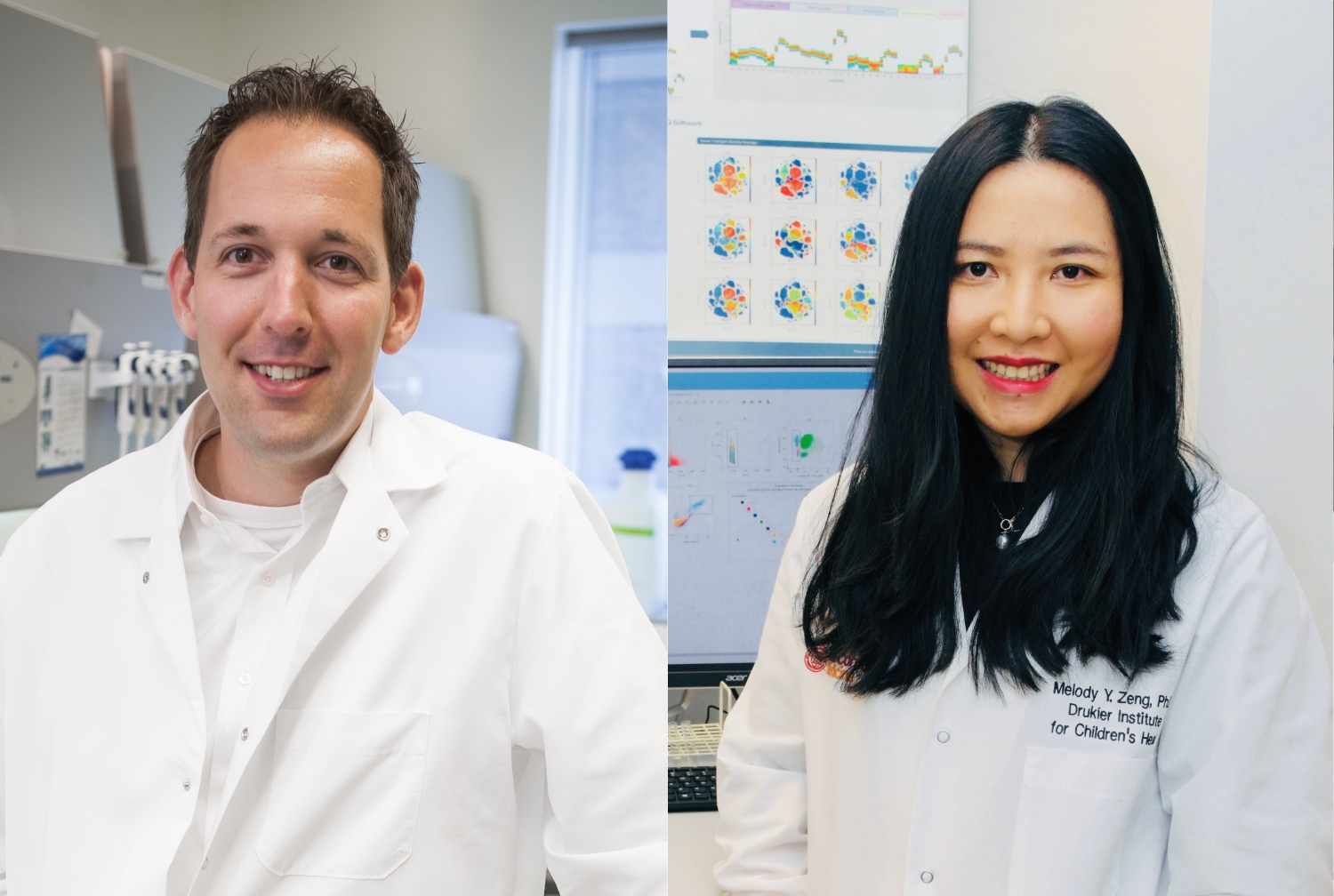Two Weill Cornell Medicine faculty members, Dr. Gregory Sonnenberg and Dr. Melody Zeng, are recipients of prestigious awards from the American Association of Immunologists (AAI) for their accomplishments in the field of immunology.
Dr. Sonnenberg is the 2023 recipient of the AAI-BD Biosciences Investigator Award, recognizing his outstanding contributions to the field of immunology as a mid-career scientist, and Dr. Zeng is a recipient of an AAI ASPIRE Award, recognizing her work as an early-career immunologist and potential for advancing the field of immunology. The AAI has been dedicated to advancing immunology to improve health and fostering development opportunities for immunologists since it was founded in 1913.
Dr. Sonnenberg, the Henry R. Erle, MD-Roberts Family Associate Professor of Medicine is being honored for his laboratory’s research defining how the immune system controls health, immunity and inflammation in tissues lining various body surfaces, such as the gastrointestinal tract and respiratory system, and how immune system dysfunction can lead to gastrointestinal diseases, multiple sclerosis, asthma or cancer. For example, Dr. Sonnenberg and his lab discovered that immune cells called group 3 innate lymphoid cells (ILC3s) play a central role in regulating immunologic tolerance and healthy immune cell interactions with trillions of beneficial microbes in the gut, known as the microbiota. They also recently found that dysfunction of ILC3s may explain how colorectal cancer progresses and why this disease is resistant to checkpoint blockade immunotherapy.
“It is a tremendous honor to be chosen as the 2023 recipient of the AAI-BD Biosciences Investigator Award. I am also very humbled to be recognized by this important association and to be included among a list of prior recipients that are such phenomenal scientists,” said Dr. Sonnenberg, who is also a member of the Division of Gastroenterology & Hepatology and Jill Roberts Institute for Research in Inflammatory Bowel Disease at Weill Cornell Medicine. “This award also recognizes the significant contributions and dedication of talented individuals that I am lucky enough to have worked with in my lab over the years, as well as close collaborators and colleagues within our multidisciplinary network at Weill Cornell Medicine.”
Dr. Zeng, an assistant professor of immunology in pediatrics, is being recognized for her research and contribution to the growing collective evidence that the gut microbiota regulates the immune system. As a postdoctoral fellow at the University of Michigan School of Medicine, she was among the first to discover that a class of antibodies called IgG recognizes gut bacteria for maintenance of host-microbe symbiosis in the intestine. Dr. Zeng established her lab at Weill Cornell Medicine in 2019 and has continued to study the role of IgG in immune regulation by gut bacteria and its role in inflammatory and infectious disorders in early life. For example, her team recently discovered in a preclinical study that IgG antibodies transferred from mothers to infants through breast milk help shape infants’ gut bacteria and immunity against pathogenic bacteria that cause diarrheal illness.
“I am very honored and excited to be recognized along with the other recipients of this year’s AAI ASPIRE Award,” said Dr. Zeng, who is also a member of the Gale and Ira Drukier Institute for Children’s Health at Weill Cornell Medicine. “The annual AAI Meeting is a preeminent conference for immunologists, providing a platform for trainees to showcase their research and to network. It is also where I gave my first national meeting presentation as a student more than ten years ago, and it will be a sincere thrill to give a talk as an award recipient at this year’s event. This award also acknowledges the excellent training I received from my mentors, as well as the exciting research program that my amazing team works hard every day to build with tremendous support from many of my colleagues at Weill Cornell Medicine.”
The award ceremony will take place in May in Washington, D.C., at the organization’s 106th annual conference, where Drs. Sonnenberg and Zeng will present lectures about their research.

